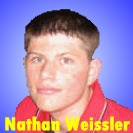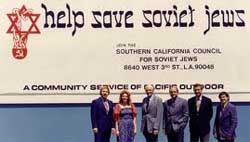Glenn Richter
by: Nathan Weissler

In the 1960s, many members of various Jewish communities began
significant advocacy work for the rights of Jews, in the Soviet Union, who were
often forbidden from making aliya to Israel and were not permitted to
freely practice Judaism in the Soviet Union. Many young people were active in
advocating for Soviet Jews. Among these activists was Glenn Richter who in 1964
was a co-founder of the Student Struggle for Soviet Jewry (SSSJ). He also worked
as a volunteer for the Student Non-violent Coordinating Committee (SNCC).
In March 2010, I interviewed Richter about his life experiences,
particularly relating to his activist work on behalf of Soviet Jewry and the
Civil Rights movement. Glenn Richter was born in New York City in 1945 and was
the youngest of two sons of Harold and Bella Richter. His older brother Dov
later made aliya.
After finishing his freshman year at Queens College in 1963, Richter began
volunteer work for SNCC in the organization’s New York office. “I was too young
to go down South,” he told me, “and even if I had gone down South, I think it
would have been a little difficult to keep kashrus in Mississippi in 1963.”
Although he was not present at the March on Washington in August 1963, Richter’s mother
attended and mailed him a postcard. Richter told me that at the time he was
participating in the Torah Leadership Seminar, run by Yeshiva University.
Richter told me that the Torah Leadership Seminar, "was there not only to
inspire you Jewishly but to encourage young Jews to take leadership positions,
that is, not just to think about doing something but to go out and do
something….I think it helped inspire me to actually get out and do something for
Soviet Jews.”

In 1964, the Student Struggle for Soviet Jewry was established which Richter and
Yaakov Birnbaum co-founded. Birnbaum originally named the group, “Students
Struggle for Soviet Jewry.” However, Richter changed the name from having a
plural to a singular connotation; thus, ”Student Struggle for Soviet Jewry.”
Regarding the motivations for the founding of the group, Richter explained,
“When I asked my parents, ‘Did you speak out during World War II?’ they said,
‘(A) we didn’t know and (B) what do we do? We as a Jewish community felt
powerless‘….[during the Soviet Jewry movement] we tried to exercise our power.”
The Soviet Jewry movement continued into the 1970s and 1980s.
In 1967, Richter married Lenore Wolfson who in May 1964 had become chapter
chairwoman of the Student Struggle for Soviet Jewry at Stern College in New York
City.
The message of the Soviet Jewry movement should be continued into contemporary
life and is especially appropriate as we remember having celebrated Passover
last month. We must continue to take advantage of every opportunity to help
members of the Jewish people regardless of where they live.